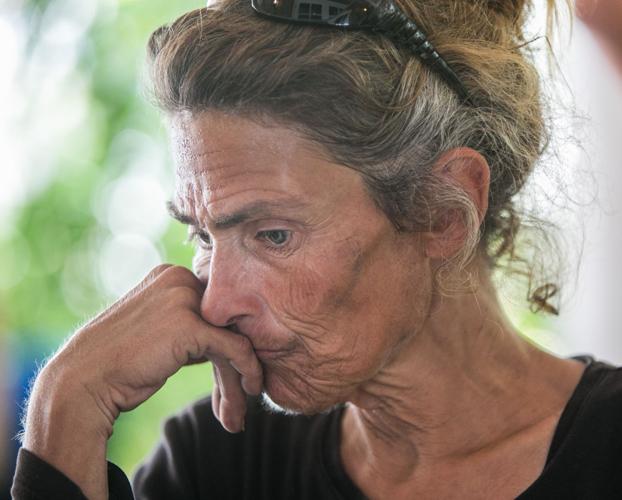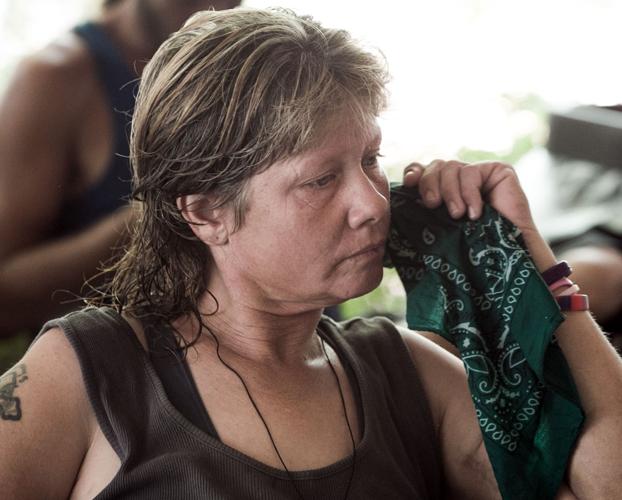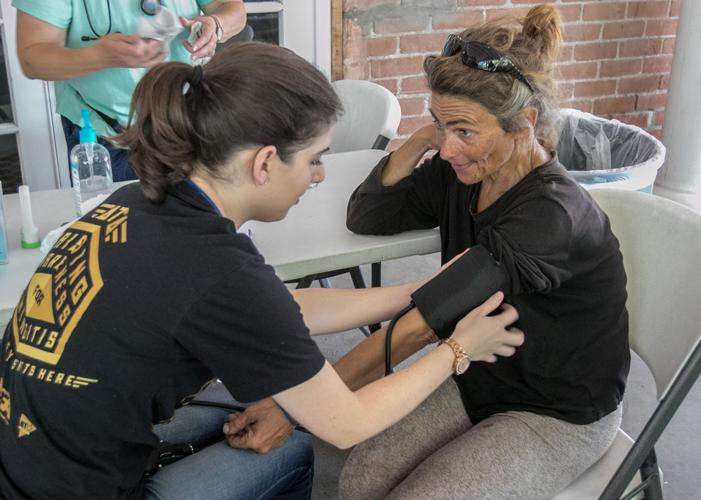Arizona could become one of the first states in the country to impose work requirements and five-year lifetime limits on “able-bodied” adult enrollees in Medicaid.
Arizona’s request to the federal government to tighten its Medicaid eligibility has been delayed by more than five months, but state officials say they are still moving forward. An answer is expected in 2018 — and the Trump administration appears favorable to the plan.
Critics worry that kicking people off Medicaid for not having a job will penalize vulnerable Arizonans, and force them to get care in emergency rooms, which in the end is more costly for the health-care system.
Among populations that could be shut out of health care if the restrictions are put in place, critics say, are adults who are caregivers for disabled children or elderly relatives, people with felonies who have trouble finding jobs and people with untreated mental illness.
“It’s easy to say these people need to work. But you need a place to live if you need a job,” said Rick McCallum, who volunteers at a welcome center for homeless people at the Z Mansion in downtown Tucson.
“People will die,” McCallum said of the work requirements. “Diabetics will lose their hands and feet.”
But proponents say the country’s Medicaid program is growing by double digits in states like Arizona that expanded Medicaid under the Afforable Care Act. Reforms like work requirements not only incentivize financial independence from government support, they are critical to maintain the Medicaid program’s viability, they say.
Instead of a safety net, Medicaid has become a poverty trap for some, where people are not working in order to keep free health care, said Naomi Lopez Bauman, health-care policy director for the Goldwater Institute, a Phoenix-based conservative think tank. “That is not good policy for anyone.”
And supporters appear to have the Trump administration on their side.
A March 14 letter to the nation’s governors says the administration wants to approve states’ Medicare provisions related to “training, employment, and independence.” The letter also says that expanding Medicaid to nondisabled, working-age adults without dependent children “was a clear departure from the core, historical mission of the program.” It was co-written by U.S. Health and Human Services Secretary Dr. Tom Price and U.S. Centers for Medicare & Medicaid Services Administrator Seema Varma.
The first indication of whether adding work requirements to Medicaid becomes a trend could be when the federal government responds to Kentucky’s request, which could be as early as this month, said Joan Alker, executive director of Georgetown University’s Center for Children and Families.
“Secretary Price and Administrator Verma have sent some pretty clear signals that they are open for business for these kinds of approaches,” Alker said. “We are expecting Kentucky’s to be approved in some form.”
Medicaid is a federal health-insurance program for low-income people; Arizona’s $12 billion program is called the Arizona Health Care Cost Containment System (AHCCCS). It enrolls one in four Arizonans — 1.9 million people, among them nearly 300,000 Pima County residents.
Arizona restored AHCCCS coverage to childless adults in 2014 at the same time it expanded Medicaid under the Affordable Care Act. The current upper income limit is $16,642 annually for an individual or $33,948 for a family of four.
“Able-bodied”
Arizona’s proposals to tighten Medicaid eligibility are rooted in a state law — Senate Bill 1092 — that passed in 2015.
The law says Arizona must apply to the federal government to impose a five-year lifetime limit as well as a work requirement on “able-bodied” AHCCCS enrollees over the age of 19 by March 30 of every year.
A draft of Arizona’s request released earlier this year said attending school or a job-training program at least 20 hours per week would also satisfy the work requirement.
The term “able-bodied” is defined as anyone over age 19 who is mentally and physically capable of working. There are exceptions, including anyone over 19 who is still in high school, sole caregivers of children under age 6, anyone who qualifies for the Arizona Long Term Care System (ALTCS) and anyone receiving long-term disability.
“Able-bodied” also excludes anyone who has been determined to be “physically or mentally unfit for employment by a health-care professional in accordance with rules adopted by the administration.”
But the draft is thin on other information, including data. Some critics worry that the language does not specifically exempt people with disabilities and mental-health issues.
0ther provisions in the draft proposal:
- Enrollees must verify the work requirement and any changes in family income on a monthly basis.
- AHCCCS can ban enrollees for a year if they knowingly fail to report a change in family income or make false statements about their compliance with work requirements.
- AHCCCS can limit lifetime coverage for all able-bodied adults to five years except for certain circumstances.
The federal government already rejected Arizona’s proposal to put SB 1092’s measures into place once — in the fall of 2016 — on the grounds that work requirements and lifetime limits could undermine access to care. And to date, no state’s request for Medicaid work requirements has been approved.
But the Trump administration has indicated it will make a decision on such requests faster than the Obama administration, the Goldwater Institute’s Lopez Bauman said. “In the coming years there will be more of a focus on how to move people from Medicaid to private insurance,” she predicted.
“The truth is the most vulnerable among us are the most likely to be hurt if Medicaid reforms such as work requirements are not enacted,” said state Sen. Nancy Barto, a Republican from Phoenix who sponsored SB 1092.
“Right now one in four Arizonans is on our AHCCCS program. That should alarm everyone,” Barto said, adding, “Furthermore, the exceptions outlined in the law exempt truly vulnerable individuals from the work requirements.”
A Kaiser Family Foundation report says a majority of Medicaid enrollees are already working. But the work requirements could nonetheless have a significant and negative impact, said Alker of Georgetown.
“It creates an unwelcome climate and it creates a lot of red tape and paperwork barriers, which increases state administrative costs. Some folks will get lost in the shuffle,” Alker said.
“I think it is a misguided policy to begin with. If you want to encourage people to work, which we all do, they need to be healthy. Taking their health care away from them is backwards, in my view.”
Missed deadline
Arizona did not submit its request to the federal government by March 30 of this year, as Senate Bill 1092 had ordered. That’s because the efforts to repeal and replace the Affordable Care Act were occurring at the time. Among other things, those efforts would have substantially changed Medicaid.
Though they missed their own deadline, AHCCCS officials still plan to seek federal approval to put the measures contained in SB 1092 into effect. They expect to submit an application this year, which means a federal decision will likely come in 2018.
AHCCCS spokeswoman Heidi Capriotti said her agency is working with Gov. Doug Ducey’s office on an application. The state’s submission will take into account 631 pages of public comment AHCCCS officials received, plus verbal comments at public forums , she said.
The public comments have been overwhelmingly negative. Opponents include the United Way, the United Congress of Obstetricians and Gynecologists, disability advocates, the Phoenix-based Children’s Action Alliance and the Inter Tribal Council of Arizona, which says high unemployment rates on reservations mean tribal members will have trouble meeting work requirements.
Some critics say monthly employment and income verification will require unnecessary administrative work. And complying will be difficult for many enrollees due to the chaos that often comes with poverty, opponents say.
“Punitive enforcement measures aimed at fostering self-responsibility can instead prevent enrollees from maintaining continuity of health care and coverage,” the Children’s Action Alliance wrote in its public comment to AHCCCS.
The Children’s Action Alliance is particularly concerned about work requirements being placed on the approximately 1,000 Arizona young adults who have aged out of foster care and are now on AHCCCS. Under the Affordable Care Act, those young adults are allowed to remain on Medicaid until age 26 with no income limit. They are a vulnerable population with disproportionate rates of chronic medical and mental-health conditions, the group says.
The Z Mansion in Tucson has a first-aid clinic staffed with volunteers that help homeless and near-homeless individuals with minor health needs, but it’s no substitute for what AHCCCS provides, program leaders say.
“Private charities will never be able to meet the need if all these people lose their insurance,” said McCallum, the Z Mansion volunteer.
“AHCCCS provides relief from the uncertainty of poverty, which we know has more tangled roots than simply a lack of work or education,” echoed Joan Serviss, executive director of the Arizona Coalition to End Homelessness, in a written comment to AHCCCS.
“Please consider the over 9,000 individuals, families, and veterans living without a safe, affordable place to call home in our state when guiding our Medicaid system toward sustainable policy solutions that will benefit all Arizonans,” she wrote.
Disabilities
While long-term disability counts as an exception to the work requirement, not everyone with chronic health issues qualifies for long-term disability through the Social Security Administration, critics note.
Many people are denied — 63 percent of initial disability claims were rejected in August, federal data show. Some end up waiting months and even years for an administrative hearing upon appeal. A pro bono legal team goes to the Z Mansion once a month to help people through the application process.
“I applied and was turned down,” said 45-year-old Jackee Brown, who has been living on the streets for eight years.
“I’m going to apply again. I get bad headaches, and I have PTSD.”
AHCCCS has been a help to Brown, particularly when it comes to getting medication for her asthma and high blood pressure, she said.
Pulling up to the Z Mansion on her bike one recent Tuesday, 50-year-old Mary Knight took a volunteer aside and told him she was worried about terrible stomach pains. She was previously diagnosed with a peptic ulcer.
“I don’t really believe in going to the hospital unless I am really sick or dead,” Knight later said in an interview.
“AHCCCS comes in handy now. I’ve had a little bit of a hard time lately.”
Knight has been living on Tucson’s streets for 25 years. Originally from Maine, she left home at 17 after her father died. She moved to Tucson with a friend in 1991 but started drinking a lot, lost her job, got evicted, and ended up homeless.
Knight, who is missing most of her teeth, is on probation for drug possession and says she likes her probation officer, who may help her find a place to live. She blames herself for becoming dependent on alcohol.
“You just conform to that way of living (on the street). It does affect you mentally, living like that for so long,” Knight said. “It would be a major adjustment, a lot for me to grasp, to go to work. But I’d work if I could get a job.”
Without AHCCCS, Jim Truitt says he’d be dead. The former truck driver says AHCCCS paid for his defibrillator, his heart medication and also for the medication he needs to keep his severe psoriasis at bay.
Truitt, who has had several strokes and looks much older than his 57 years, has applied for long-term disability but says he’s been turned down three times.
Liberty Carter, 38, says she is living on the street because her job at a call center wasn’t paying enough to cover her bills after her husband lost his income.
Carter, who has diabetes, got evicted. Her transient life made it too difficult to work. She’d like to work again, but needs housing and stability, she said. For now, AHCCCS is paying her health bills.
Bridge out of poverty
While most of the public comments submitted to AHCCCS earlier this year were negative, a few were supportive of tightening eligibility, saying too many people are dependent on the program. AHCCCS officials redacted the names of individuals who wrote in with comments.
“After working with AHCCCS patients since 2010 at the psychiatric hospital setting, it is clear to me that there is no personal accountability in our AHCCCS system,” one commenter wrote. “Health insurance is not a human right, but a service provided by government and taxpayers.”
Other commenters had mixed reactions, saying the program needs some reform, but that the monthly reporting requirements seem burdensome.
Ducey supports work requirements as a “bridge out of poverty,” and not as a measure to hurt vulnerable people, spokesman Patrick Ptak said.
He stressed that as Arizona drafts its application, critics’ concerns expressed during the public comment period will be carefully considered.
Ptak said a cornerstone of Ducey’s leadership has been removing barriers to employment for a variety of populations, including those with criminal convictions.
For example, under Ducey’s direction the state recently opened employment centers in three state prisons, including one in Tucson, Ptak said. Ducey also recently signed legislation to reduce occupational licensing fees, he said.
“Arizona runs one of the most effective and efficient Medicaid health-care programs in the country,” Ptak said. “It is widely recognized and we are always looking for ways to improve the program for all beneficiaries. We want to make sure we continue to improve.”






